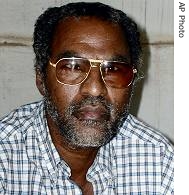2006年VOA标准英语-Al-Qaida 'Leader' in Sudan Claims Newspaper Edi(在线收听)
By Noel King
Khartoum
13 September 2006
A group calling itself al-Qaida in Africa has reportedly claimed responsibility for the death of a Sudanese editor in Khartoum. Mohamed Taha was found beheaded last Wednesday. In the days following Taha's death, Sudanese security has begun cracking down on newspapers in Khartoum.
-------
 Mohammed Taha Mohammed Ahmed (Undated file picture) |
||
The statement has not been independently confirmed.
In April 2005, Editor Mohamed Taha printed an article that questioned the lineage of the Muslim prophet Mohamed.
Taha, an ally of Sudan's Islamist government, was arrested and his Al Wifaq newspaper closed down.
Thousands of demonstrators stood outside the courthouse where Taha was tried in June 2005, calling for his death; but he was acquitted of the charges.
Taha's murder has cast a pall over the press in Sudan, and raised questions about the presence of Islamist militants in Sudan.
Many Sudanese are skeptical of yesterday's statement issued by the group claiming to be al-Qaida.
Political Scientist Dr. Hassan Makki of Africa University in Khartoum says the statement does not bear the hallmarks of al-Qaida.
"I haven't heard the name of Abu Hafs al-Sudani. It is too late. After seven days they established this announcement. Al-Qaida usually announces its declarations on the same day," he said.
In the days after Taha's body was found, several local editors reported that their newspapers had been confiscated and that they had given instructions to stop printing articles about Taha's death.
Faisal El Bagir, the head of Information and Media with the Sudanese Organization Against Torture, a rights group based in the U.K., told VOA from Khartoum that editors have been given orders to stop writing about Taha's murder.
"I think what is happening nowadays is very serious and a very severe attack on freedom of expression," he said. "There is censorship by the security starting from the 6th of September, the day of the announcement of the death of Mohamed Taha. They have been coming into the newspapers, each and every day and reading them, giving instructions of what is to be published and what is not to be published. This censorship is continual now."
Alfred Taban of the independent Khartoum Monitor says Taha's death and the subsequent crackdown on the press are an attempt at intimidation.
Taban told VOA that the recent crackdown by the Sudanese government violates the terms of the January 2005 Comprehensive Peace Agreement, which ended twenty one years of civil war between north and south Sudan.
"We will continue to print our newspapers. This is censorship and we will continue to fight it as we have done for all these years," said Taban. "We have been closed down ten times in five years and we have always come back. We are definitely going to continue as we have been doing without any hesitation."
Al-Qaida leader Osama bin Laden lived in Sudan in the 1990s until Khartoum expelled him in 1996 under U.S. and Saudi pressure.
Last March, bin Laden called on al-Qaida members to fight against United Nations intervention in the war-torn Darfur region.
The Sudanese government immediately distanced itself from bin Laden, but has itself, continued to insist that the U.N. is not welcome in Darfur.